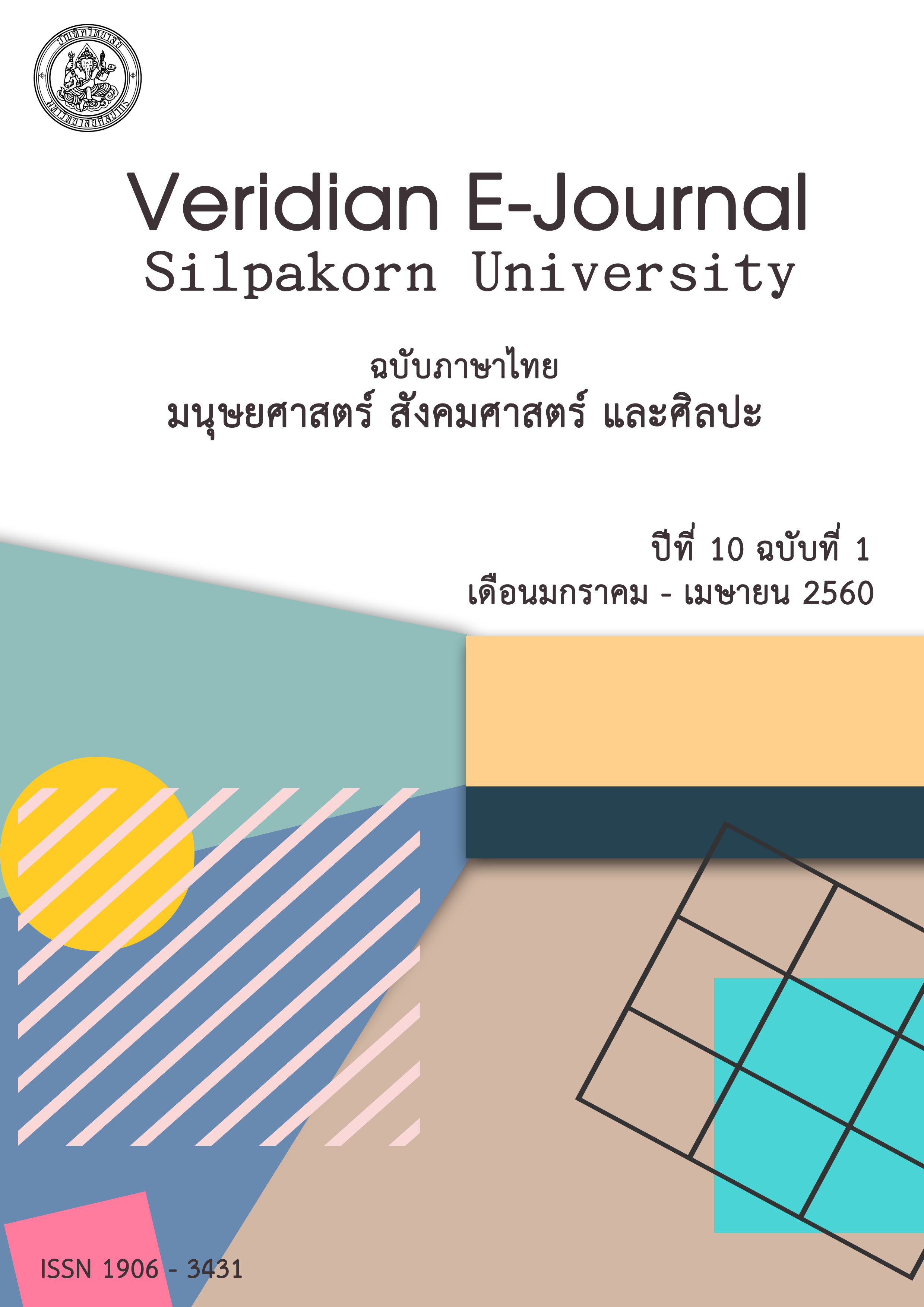การพัฒนาความรู้และความตระหนักในการจัดการขยะ สำหรับนิสิตสาขาวิชาเกษตรและสิ่งแวดล้อมศึกษาผ่านการมีส่วนร่วมระหว่างเครือข่ายมหาวิทยาลัย โรงเรียน และชุมชน
Main Article Content
Abstract
การวิจัยเชิงปฏิบัติการนี้มีเป้าหมายเพื่อพัฒนาความรู้และความตระหนักในการจัดการขยะสำหรับนิสิตสาขาวิชาเกษตรและสิ่งแวดล้อมศึกษาผ่านการมีส่วนร่วมระหว่างเครือข่ายมหาวิทยาลัย โรงเรียน และชุมชน กระบวนการวิจัยมี 3 ระยะ ได้แก่ 1) ระยะเตรียมความพร้อม 2) ระยะออกแบบและดำเนินการจัดกิจกรรม3) ระยะสรุปและสะท้อนผล กลุ่มเป้าหมายเป็นนิสิตสาขาวิชาเกษตรและสิ่งแวดล้อมศึกษา คณะศึกษาศาสตร์และพัฒนศาสตร์ ชั้นปีที่ 3 จำนวน 35 คน ดำเนินการเก็บรวบรวมข้อมูลโดยการใช้แบบทดสอบก่อนและหลังการจัดกิจกรรม แบบวัดความตระหนัก และหลังจากเสร็จสิ้นกิจกรรมดำเนินการสรุปและสะท้อนผลโดยการสัมภาษณ์และสนทนากลุ่ม วิเคราะห์ข้อมูลโดยใช้สถิติ ได้แก่ ร้อยละ ค่าเฉลี่ย ค่าเบี่ยงเบนมาตรฐานสถิติทดสอบที (t-test) และการวิเคราะห์เนื้อหา
ผลการวิจัยพบว่า นิสิตมีบทบาทในการออกแบบและดำเนินการจัดกิจกรรมพัฒนาความรู้และความตระหนักในการจัดการขยะสำหรับนักเรียนร่วมกับนักวิจัย ครู และผู้นำชุมชนในลักษณะของฐานการเรียนรู้จำนวน 5 ฐาน ได้แก่ 1) แหล่งที่มาของขยะ 2) ประเภทและการคัดแยกขยะ 3) สัญลักษณ์เกี่ยวกับขยะ 4) หลักการจัดการขยะ และ 5) ขยะในชีวิตประจำวัน หลังจากการดำเนินการจัดกิจกรรม พบว่า นิสิตมีความรู้เกี่ยวกับการจัดการขยะหลังการจัดกิจกรรมสูงกว่าก่อนเข้าร่วมกิจกรรมแตกต่างกันอย่างมีนัยสำคัญทางสถิติที่ 0.001 และมีความตระหนักเกี่ยวกับการจัดการขยะหลังการจัดกิจกรรมสูงกว่าก่อนเข้าร่วมกิจกรรมแตกต่างกันอย่างมีนัยสำคัญทางสถิติที่ 0.003 ผลจากการสังเกตพฤติกรรม พบว่านิสิตนำความรู้การคัดแยกขยะมาประยุกต์ในชีวิตประจำวันและนิสิตสามารถนำประสบการณ์ไปต่อยอดในการจัดการเรียนรู้ทางด้านเกษตรและสิ่งแวดล้อมได้ ผลการสะท้อนคิดพบว่า เป็นกิจกรรมที่เกิดประโยชน์กับนิสิตโดยตรง นิสิตได้พัฒนาศักยภาพความเป็นผู้นำ กระบวนการทำงานเป็นทีม การนำประสบการณ์ไปปรับใช้และพัฒนากระบวนการจัดการเรียนรู้ทางด้านเกษตรและสิ่งแวดล้อมได้ในอนาคต และมีข้อเสนอแนะว่าควรมีการพัฒนาความรู้และความตระหนักควบคู่กับการพัฒนาศักยภาพให้กับนิสิตทุกชั้นปี
This action research aimed to develop the knowledge and awareness of garbage management for students major of Agriculture and Environmental Education through participation of university, local school and community network. The research methodology divided into three phases, including 1) preparation phrase, 2) activity design and operation phrase, 3) result summary and reflection. The target group was 35 third year students major of Agricultural and Environmental Education, Faculty of Education and Development Sciences. Data collection was performed by using before and after activity questionnaire, awareness measure, and result summary and reflection via interviews and focus groups. Data were analyzed using statistics, including percentage, average, standard deviation, t-test and content analysis.
The research found that students had role in designing and operating activities for the development of knowledge and awareness of garbage management for students together with researchers, teachers and community leaders as a form of 5 learning bases, including 1) the source of the garbage, 2) category and garbage separation, 3) symbol related to garbage, 4) garbage management principles, and 5) waste on a daily basis. After the activities, it was found that students gained more knowledge about garbage managementthan before the participation at a statistical significant of 0.001, and had more awareness about garbage management than before the participation at a statistical significant of 0.003. The result of observation found that students adapt and applied the knowledge of garbage separation in everyday life and waste management within the university farm. Also, the students could develop the experience for further environment and agriculture management. According to the results reflection, this activity directly benefited the students. Students developed leadership, teamwork, applicative experience for development of future learning and managing agriculture and environment. There was a suggestion stated that the development of knowledge and awareness should be operated together with the potential development for students every year.
